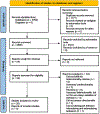The bidirectional relationship between sleep and externalizing behavior: A systematic review
- PMID: 38405369
- PMCID: PMC10888506
- DOI: 10.1016/j.sleepe.2022.100039
The bidirectional relationship between sleep and externalizing behavior: A systematic review
Abstract
It is well-established that sleep and behavior are interrelated. Although studies have investigated this association, not many have evaluated the bidirectional relationship between the two. To our knowledge this is the first systematic review providing a comprehensive analysis of a reciprocal relationship between sleep and externalizing behavior. Five databases (PsycINFO, PubMed, Web of Science, Scopus, and Google Scholar) were utilized to yield a total of 3,762 studies of which 20 eligible studies, empirical articles examining bidirectionality of sleep and externalizing behavior, were selected for analysis. According to the guidelines of the Preferred Reporting Items for Systematic Review and Meta-Analysis, the varying methodological approaches used in these studies were analyzed and synthesized, including examining differences and similarities in outcomes between distinct study designs (longitudinal vs cross-sectional), sleep measures (objective vs subjective vs a combination of both), informants (parents, self-report, teachers), and recruited participants (clinical, subclinical and typical populations). The assessment of risk of bias and quality of studies was guided by the instruments employed in research on sleep and behavior in the past. This review establishes that a bidirectional relationship between sleep problems and externalizing behavior clearly exists, and identifies limitations in the existing literature. Furthermore, the importance of early interventions that target both externalizing behaviors and sleep problems is highlighted as a potentially effective way of breaking the sleep-externalizing behavior relationship. Nonetheless, causality cannot be claimed until more trials that manipulate sleep and evaluate changes in externalizing behavior are conducted.
Keywords: Bidirectionality; Externalizing behavior; Sleep; Sleep disturbances; Systematic review.
Figures
Similar articles
-
The future of Cochrane Neonatal.Early Hum Dev. 2020 Nov;150:105191. doi: 10.1016/j.earlhumdev.2020.105191. Epub 2020 Sep 12. Early Hum Dev. 2020. PMID: 33036834
-
Association of Screen Time With Internalizing and Externalizing Behavior Problems in Children 12 Years or Younger: A Systematic Review and Meta-analysis.JAMA Psychiatry. 2022 May 1;79(5):393-405. doi: 10.1001/jamapsychiatry.2022.0155. JAMA Psychiatry. 2022. PMID: 35293954 Free PMC article.
-
Beyond the black stump: rapid reviews of health research issues affecting regional, rural and remote Australia.Med J Aust. 2020 Dec;213 Suppl 11:S3-S32.e1. doi: 10.5694/mja2.50881. Med J Aust. 2020. PMID: 33314144
-
Prenatal risk factors for internalizing and externalizing problems in childhood.World J Pediatr. 2020 Aug;16(4):341-355. doi: 10.1007/s12519-019-00319-2. Epub 2019 Oct 15. World J Pediatr. 2020. PMID: 31617077 Free PMC article. Review.
-
Bidirectional associations between sleep quality or quantity, and dietary intakes or eating behaviors in children 6-12 years old: a systematic review with evidence mapping.Nutr Rev. 2021 Sep 7;79(10):1079-1099. doi: 10.1093/nutrit/nuaa125. Nutr Rev. 2021. PMID: 33440009
Cited by
-
Bidirectional relationship between child happiness and sleep quality and the predictive role of prenatal psychosocial support: results from U.S. and China cohort studies.World J Pediatr. 2025 May 30. doi: 10.1007/s12519-025-00903-9. Online ahead of print. World J Pediatr. 2025. PMID: 40442376
-
Trajectories of actigraphy-derived sleep duration, quality, and variability from childhood to adolescence: downstream effects on mental health.Sleep. 2024 Aug 14;47(8):zsae112. doi: 10.1093/sleep/zsae112. Sleep. 2024. PMID: 38758702 Free PMC article.
-
Improving adolescent sleep in long-term Juvenile correctional settings: case examples with clinical, research, and policy implications.Sleep Adv. 2024 Feb 4;5(1):zpae006. doi: 10.1093/sleepadvances/zpae006. eCollection 2024. Sleep Adv. 2024. PMID: 38425455 Free PMC article.
-
Status and epidemiological characteristics of depression and anxiety among Chinese university students in 2023.BMC Public Health. 2025 Mar 28;25(1):1189. doi: 10.1186/s12889-025-22443-7. BMC Public Health. 2025. PMID: 40155930 Free PMC article.
-
Bidirectional associations between accelerometer-based sleep metrics and mental health symptoms from childhood to late adolescence: data from a Brazilian birth cohort.BMC Med. 2025 Aug 15;23(1):475. doi: 10.1186/s12916-025-04296-4. BMC Med. 2025. PMID: 40817056
References
-
- Steinsbekk S, Wichstrøm L. Stability of sleep disorders from preschool to first grade and their bidirectional relationship with psychiatric symptoms. J Dev Behav Pediatrics 2015;36(4):243–51. - PubMed
-
- Sheppes GSG, Gross JJ. Emotion regulation and psychopathology. Annu Rev Clin Psychol 2015(11):379–405. - PubMed
-
- Gilbert KE. The neglected role of positive emotion in adolescent psychopathology. Clin Psychol Rev 2012;32(6):467–81. - PubMed
Grants and funding
LinkOut - more resources
Full Text Sources
Miscellaneous

